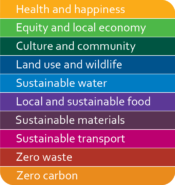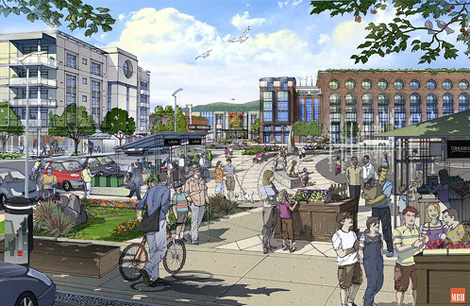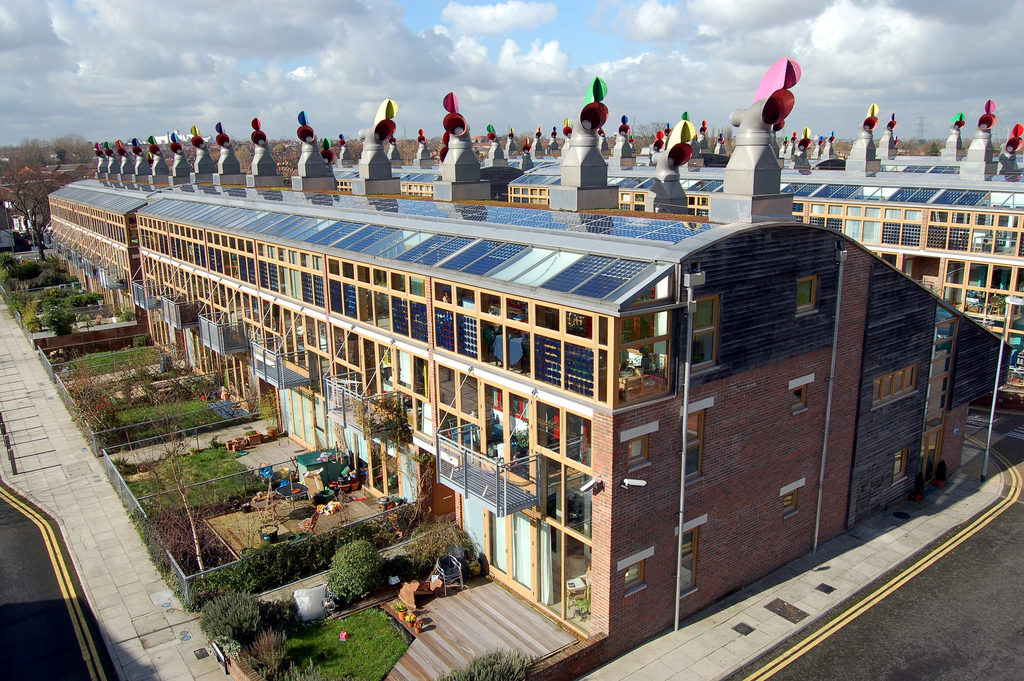Waldorf News
Credo High: The World’s First One Planet School

By Chip Romer and David Kennedy
Next month, Credo High School in Rohnert Park, California, will move to its permanent campus within SOMO Village, a groundbreaking sustainable community planned by Brad Baker of SOMO Village, LLC and the international nonprofit, One Planet Communities. SOMO Village intends to be the model sustainable community for North America.
Locating Credo High within SOMO Village has always been the intention of Credo developers, who believe that housing their students within the sustainability guidelines of SOMO Village will develop and deepen students’ own values around the many aspects of sustainability.
In addition to 1600 homes, the 200-acre, live-work development will include green businesses, a 250-unit retirement community of the San Francisco Zen Center, playing fields, music venues, arts organizations and 25 acres of farmable land. Credo has been approved to become the world’s first One Planet School.
Moving to SOMO Village is the culmination of a nine-year plan by Credo developers. Credo will convert an existing 35,000 sq. ft. portion of a building that was recently a business incubator and once a Hewlett Packard research facility into their school campus.

History and Background of Credo High
The North Bay of San Francisco has seven K-8 Public Waldorf schools, which opened between 1995 and 2014. These K-8 schools serve about 2,000 students annually. The North Bay has the densest concentration of Waldorf schools in the world, with four private and eight public Waldorf schools. Credo High is at the geographic and social center of this demographic.
In 2000, Credo High’s Executive Director, Chip Romer, founded one of these K-8 schools, Sonoma’s Woodland Star Charter School, and served as administrator there until 2008. He left to lead a development team of twelve people who spent three years planning Credo High School, wanting to ensure that graduates of the North Bay’s K-8 Public Waldorf schools would have the opportunity to complete the K-12 Waldorf curriculum in a Public Waldorf high school.
In 1919, Waldorf education was created out of the aftermath of WWI, with the noble intention of developing young peacemakers who would have the creative thinking capacity to resolve conflict without resorting to violence.
Aligned with this original mission, Credo’s development team very purposely set out to design a Public Waldorf high school, available to all, that would address its students as leaders of the future, preparing them for the urgent challenges that will await them as young adults—climate change and environmental degradation, famine and food shortages, war and social conflict, terrorism and xenophobia, and global health challenges.
Credo High School opened with a ninth grade in 2011. These initial students remained the lead class and became Credo’s first graduates in 2015. Credo has 244 students enrolled this year and expects to grow to 350 next year, and 605 over the next ten years.
Sustainability & Global Citizenship
Recognizing that addressing climate change and environmental degradation is paramount, Credo’s development team chose to make sustainability a core value of the school. Credo teaches five key aspects of sustainability:
Environmental sustainability, taught in annual courses such as Climate Change, Ocean Ecology, Environmental Science and Biomimicry, and held as an overarching value in Credo’s culture to reuse, recycle, compost and value our limited resources. After a rigorous vetting process, Credo is the only public school to be certified as a Green Business by the Sonoma County Economic Development Board.
Agricultural sustainability, taught annually to all students as farming and food literacy. All students work in developing and maintaining the current campus’ three organic gardens, transformed by students (with jackhammers) from concrete wastelands to food production. The new SOMO campus will have a 1/3-acre garden directly outside the front door and access to 25 acres of farmland.
Economic sustainability, taught as financial literacy and as a point of view in many social studies classes.
Social sustainability, a weekly period for all four years, teaching students effective communication skills, conflict resolution, consensus building, collaboration and team building.
Personal sustainability, also taught weekly for four years, guiding students to become more mindful and self-aware, helping them to know themselves more deeply by addressing the questions, “Who am I? Who do I want to become? How do I get there?”
Credo’s development team believed that leadership of the future will require a global perspective, and therefore created a curriculum and culture that promotes global citizenship. Credo courses include Native American History, World Cultures, and Globalization.
All students take four years of world language, either Spanish or Mandarin. Credo hopes to add Arabic in 2017-18. The school encourages foreign exchanges, and has held exchanges with students from Spain, Argentina, Peru, Chile, Germany, Scotland, France, Turkey, and Pakistan.
BioRegional and One Planet Living
BioRegional was created in response to two environmental concerns of its founders: widespread unsustainable use of the world’s resources, and the unfair distribution of resources between the developed and developing world. BioRegional’s response has been to initiate practical sustainability solutions and deliver them by establishing new enterprises, projects, and partnerships around the world.
This has been accomplished through the concepts of bioregionalism (using local and recycled resources to meet everyday needs) and One Planet Living (improving quality of life by a fair distribution of the Earth’s resources.) BioRegional assists and encourage others to achieve sustainability through co-invention, design, advisory services, education, and information policy.
BioRegional’s One Planet Living framework is based on Ten Guiding Principles used in all of its projects: Zero Carbon, Zero Waste, Sustainable Transport, Sustainable Materials, Local and Sustainable Food, Sustainable Water, Land Use and Wildlife, Culture and Heritage, Equity and Local Economy, and Health and Happiness.

The One Planet Communities program is creating a network of the Earth’s greenest neighborhoods, where it is easy, attractive, and affordable to live a healthy, happy lifestyle while sharing a fair amount of the planet’s resources. Working with developers around the world, the program currently has projects in the USA (SOMO Village), United Kingdom, Canada, Europe, and Africa, with others planned in China and Australia.
In addition to collaborating with its partners to design and construct One Planet Communities, BioRegional also provides advisory and training services in sustainable design and practice to various actors in other industry sectors, including manufacturing, retail, commerce, and government.

Beddington Zero Energy Development (BedZED) environmentally friendly housing development in Hackbridge, London. BedZED is the UK’s first large-scale, mixed use sustainable community with 100 homes, office space, a college, and community facilities. Completed in 2002, this pioneering eco-village in south London suburbia remains an inspiration for sustainable neighbourhoods and One Planet Living Communities across the world. It is also Bioregional’s headquarters.
BioRegional CEO Pooran Desai studied at Oxford and Cambridge Universities prior to working in the sustainable forestry industry. His work there led to the development of the BioRegional Charcoal Company, one of the first sustainability companies founded by Desai and his wife, Sue Riddlestone. In 1997 the couple initiated the BedZED eco-village project, where they currently reside. Desai is a passionate member of the Credo High School Advisory Board.

Somo Village
SOMO Village is a $1 billion, 200-acre mixed-use redevelopment of a former Hewlett Packard/Agilent Technologies campus in Rohnert Park, California, about one mile from Sonoma State University. SOMO Village intends to be the model sustainable community of North America, meeting One Planet’s Ten Guiding Principles, including zero waste, zero carbon use, and generating all power on site though the state’s largest private solar arrays.
SOMO Village is the ideal place to locate Credo High School. Credo students will spend their formative high school years living within the One Planet values, and then disseminate those values as they graduate from high school and move out into the world. Credo will function as the informal community center for SOMO Village, offering sporting events, plays, concerts, lectures, and classes in the arts and academic subjects to community residents beyond the school’s student population.
In 2016, Credo hired a K-12 Waldorf graduate, Marika Ramsden, MA, as One Planet Living Director to assist in embedding the One Planet Principles into the Credo culture. In addition to teaching at Credo, Ms. Ramsden is also the US leader of One Planet school development. At Credo, the first course of ninth grade is an interdisciplinary course called “The Economics of Climate Change” and Ms. Ramsden contributes to this course by leading students through an assessment of their personal environmental footprints and engaging them to become environmental change agents. Each of the ten principles has a dyad of Credo student leaders who comprise the One Planet Leadership Team, educating the rest of the Credo community about the importance of each particular principle.
The Zero Waste team, for example, created a consciousness-raising event around Halloween, getting all students to save candy wrappers in plastic bottles and use the resulting “bricks” to build a cob-covered garden bench. The Sustainable Water team has been researching filtered “hydration stations” for the new campus to encourage the consumption of healthy water and discourage the use of disposable plastic bottles. As the OPL team becomes more expert in their areas, members will learn to conduct volunteer audits of North Bay businesses to reduce their environmental impacts.
In time, Credo students will have meaningful responsibilities to the broader SOMO Village community, farming to produce food for school consumption and for the community at large. Credo students will volunteer to support residents of the Zen retirement community, will oversee village recycling programs, and educate local businesses and residents about how to align with the One Planet Principles. Students will practice for their future work in the world by their contributions to ensuring sustainability within the SOMO Village.
As an early tenant of the SOMO Village project, Credo High School will inform the values of the developing community. School leaders are inviting families to move to SOMO from around the country to live in the greenest, most sustainable neighborhood in North America, send their students to Credo High, and bring their grandparents to live in the Zen retirement community.
The World’s First One Planet School
Credo High School and One Planet Communities are committed to developing Credo at SOMO Village as the nation’s first One Planet School. The organizations are collaborating to create and employ a replicable One Planet Curriculum that includes educating students, conceptually and experientially, about Zero Carbon, Zero Waste, Sustainable Transport, Sustainable Materials, Local and Sustainable Food, Sustainable Water, Land Use and Wildlife, Culture and Heritage, Equity and Local Economy, and Health and Happiness.
Help Fund Credo’s New Campus
Credo has secured a 20 year lease at SOMO Village, and anticipates a need for $2.5M for tenant improvements, 50% of which has already been secured. Credo is seeking donors with shared values to help with the remaining tenant improvements and support Credo in developing as a replicable One Planet School.
Credo High School Community believes that together we can develop future leaders who will have the capacities, creativity, and motivation to successfully address the urgent environmental and other challenges facing our planet. Those interested in supporting Credo may contact Credo board member Kelly Hennessy, Kelly@credohigh.org.
 Discovering the Wisdom of Childhood
Discovering the Wisdom of Childhood Transforming Voices Worldwide
Transforming Voices Worldwide Association for a Healing Education
Association for a Healing Education Art of Teaching Summer Courses 2025
Art of Teaching Summer Courses 2025 The Art of Administration and Leadership
The Art of Administration and Leadership Dancing for All Ages
Dancing for All Ages The Journey is Everything
The Journey is Everything Roadmap to Literacy Books & Courses
Roadmap to Literacy Books & Courses Quality Education in the Heartland
Quality Education in the Heartland Waldorf-inspired Homeschool Curriculum
Waldorf-inspired Homeschool Curriculum Flexible preparation for your new grade
Flexible preparation for your new grade Immersive Academics and Arts
Immersive Academics and Arts Storytelling Skills for Teachers
Storytelling Skills for Teachers Bringing Love to Learning for a Lifetime
Bringing Love to Learning for a Lifetime Caring for All Stages of Life
Caring for All Stages of Life Waldorf EC Training & Intensives in Canada
Waldorf EC Training & Intensives in Canada Train to Teach in Seattle
Train to Teach in Seattle Grade Level Training in Southern California
Grade Level Training in Southern California ~ Ensoul Your World With Color ~
~ Ensoul Your World With Color ~ Bay Area Teacher Training
Bay Area Teacher Training Everything a Teacher Needs
Everything a Teacher Needs Jamie York Books, Resources, Workshops
Jamie York Books, Resources, Workshops Space speaks. Its language is movement.
Space speaks. Its language is movement. Apply Today: New Cohort Starts Nov. 2025
Apply Today: New Cohort Starts Nov. 2025 Summer Programs - Culminating Class Trips
Summer Programs - Culminating Class Trips Full-Time Teacher Education
Full-Time Teacher Education Middle School Science With Roberto Trostli
Middle School Science With Roberto Trostli RSS Feeds
RSS Feeds